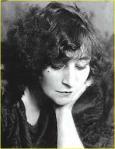‘There is always a moment in the life of young people,’ Colette wrote, ‘when dying is just as normal and seductive to them as living, and I hesitated.’ She was 28 at the time to which this quotation refers, and had sunk into a complex and unexplained illness. Later biographers have wondered whether her philandering husband had given her some unpleasant disease, but although she doesn’t expressly say so, Colette knew she was suffering just as much from the philandering. She had tried to cover it up and present a brave and invincible front, but it was by no means the truth of the matter.

To add insult to injury her husband, Willy, ran a publishing factory, signing his name to a host of books and articles produced by other writers. At his suggestion, Colette had produced a 600-page manuscript of lightly fictionalised adolescent adventures. Willy had been disappointed in it and left it to languish in a drawer. In years to come it would turn out to be the first bestseller that France had ever known, but for now he rejected it out of hand. This double betrayal left Colette horribly miserable, and she succumbed to an illness it would take her the better part of a year to shake off.

But in practice, the commitment to emotional and sexual freedom was extremely difficult to maintain. Shortly after they had embarked on their relationship, Beauvoir became close friends with a young woman she taught, Olga Kosakiewicz. Olga was dazzled by the brilliance of Beauvoir and Sartre and hypnotised by the glamour of their unorthodox liaison. Sartre fell in love with her in a more physical way, and although Olga would always resist him, they moved her in with them and lived a ménage à trois that caused them all great suffering. Sartre told Beauvoir everything, thinking this to be some sort of purification of his soul and a validation of their exceptional love. He told her that with Olga, he ‘experienced alarm, frenzy and ecstasy’ and recounted every detail of what went on between them. Beauvoir wrote that ‘The agony which this produced in me went far beyond mere jealousy’. She wanted to deal with whatever Sartre threw at her, to be worthy of his love. But the comfort she derived from hoping that Olga would be a passing phase made her question the solidity of Sartre’s love for herself, Simone. ‘At times I asked myself whether the whole of my happiness did not rest upon a gigantic lie.’ Her illness grew out of the turmoil these tangled relationships created in her.
I was 28 years old, almost 29, when I fell ill with the viral pneumonia that would become chronic fatigue. Of course, this means nothing at all, it’s simply a coincidence. But I couldn’t help being struck by it, as I was reading the biography of Simone de Beauvoir and Jean-Paul Sartre. Colette I already knew about. Thankfully Mr Litlove was not a philanderer, but I was exhausted by work, and by the new ménage à trois we had with our baby son. When I realised Beauvoir had fallen ill at the same age, I could not help but marvel at the way books continue to offer such unexpected solidarity. For the first time, I realised that that unfortunate episode in my life put me in exceptionally good company. I found I minded it a whole lot less, viewed from that perspective!
